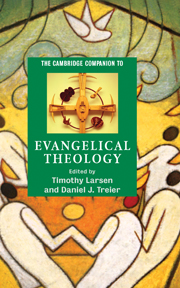Book contents
- Frontmatter
- 1 Defining and locating evangelicalism
- Part I: Evangelicals and Christian doctrine
- 2 The triune God of the gospel
- 3 Scripture and hermeneutics
- 4 Jesus Christ
- 5 The human person in the Christian story
- 6 Justification and atonement
- 7 The Holy Spirit
- 8 Conversion and sanctification
- 9 The church in evangelical theology and practice
- Part II: The contexts of evangelical theology
- Index
4 - Jesus Christ
from Part I: - Evangelicals and Christian doctrine
Published online by Cambridge University Press: 28 September 2007
- Frontmatter
- 1 Defining and locating evangelicalism
- Part I: Evangelicals and Christian doctrine
- 2 The triune God of the gospel
- 3 Scripture and hermeneutics
- 4 Jesus Christ
- 5 The human person in the Christian story
- 6 Justification and atonement
- 7 The Holy Spirit
- 8 Conversion and sanctification
- 9 The church in evangelical theology and practice
- Part II: The contexts of evangelical theology
- Index
Summary
Along with the Scripture principle, the axiom of solus Christus has been a hallmark of theologies in the Reformation tradition. The first indicates the priority of divine revelation over tradition, speculation, or immediate experience; the second acknowledges the sovereignty of divine grace in incarnation and redemption over against apparently synergistic conceptions of its mediation through church, sacrament, or the moral acts of Christian existence. The perfection of Christ - the integrity and completeness of his person as the God-man, and the non-transferability of his offices - is Christologically and soteriologically fundamental. For much of Protestant theological history, the incarnational and Trinitarian metaphysics underpinning these commitments were taken for granted as non-controversial. In the post-Reformation confessional period, disagreements emerged between Lutheran and Reformed over the relation of the divine and human natures of the incarnate one, partly in relation to eucharistic controversies over the ubiquity of Christ's humanity. Lutherans emphasized that the humanity of the ascended Christ shares the divine property of omnipresence, and so is present in the eucharistic elements, whereas the Reformed stressed that his humanity is localized in heaven, not in the sacrament, and that his finite human nature is incapable of containing the infinite divine Word. But both confessions remained firmly attached to the Christological orthodoxy articulated at the Council of Chalcedon: in the one person Jesus Christ fullness of deity and fullness of humanity are united, the union of the natures being such that they can neither be divided nor confused.
- Type
- Chapter
- Information
- The Cambridge Companion to Evangelical Theology , pp. 51 - 64Publisher: Cambridge University PressPrint publication year: 2007



